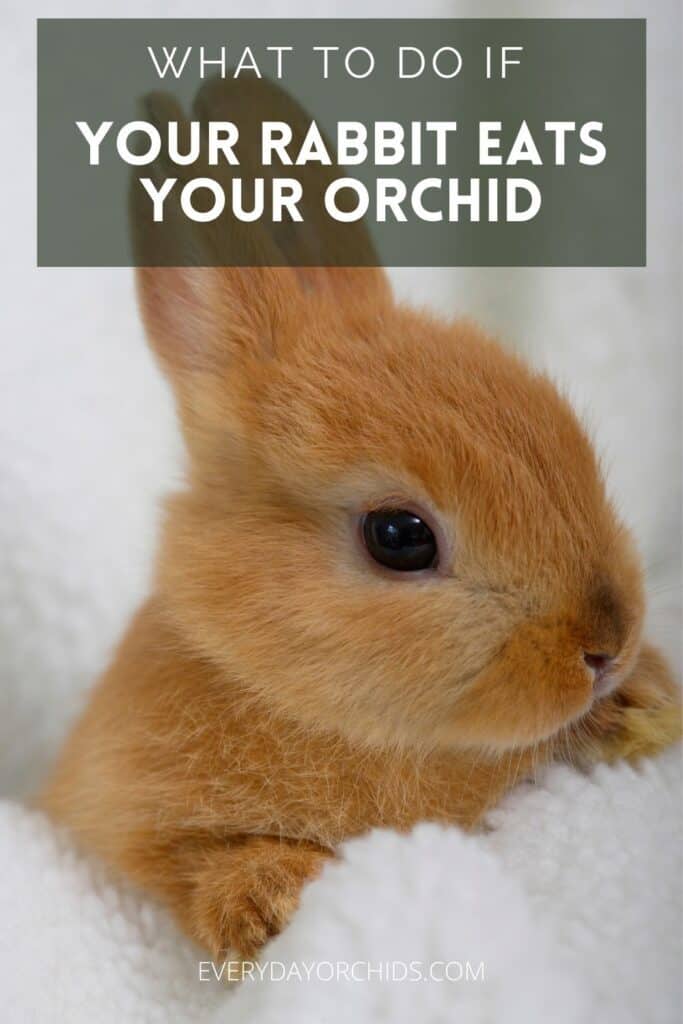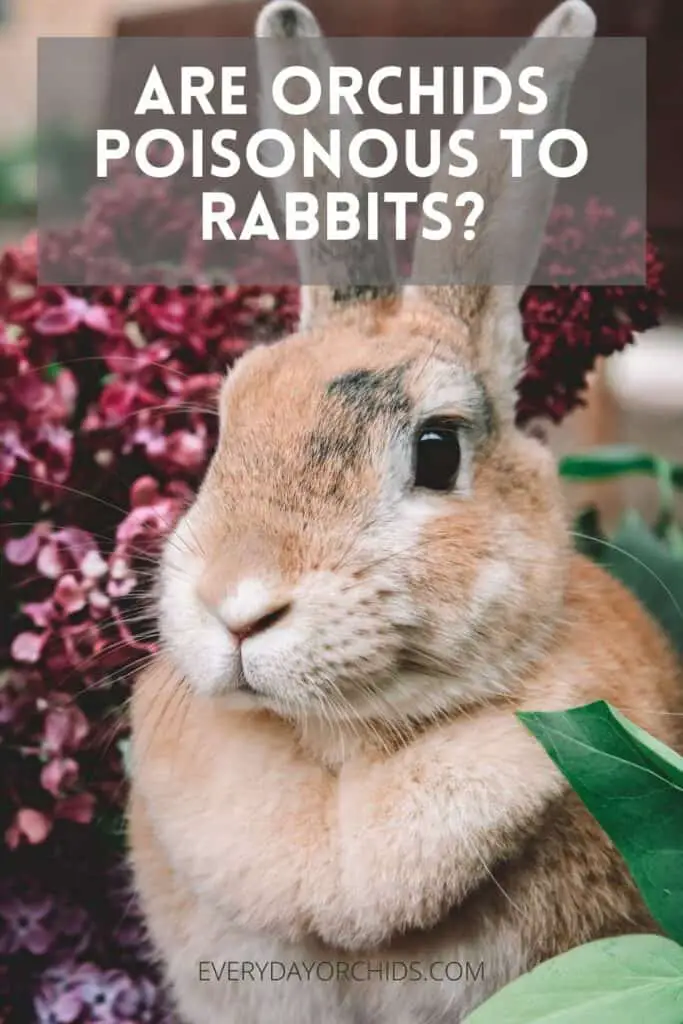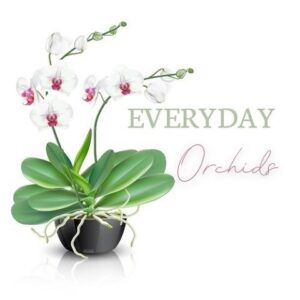If you own both an orchid and a rabbit, you may wonder if orchids are safe to have around your pet, and whether orchids are poisonous or toxic to rabbits. This may especially be of concern if you discover that your pet bunny has been munching away at your orchids.
It’s not entirely surprising that your rabbit might sample your houseplants. Rabbits are naturally curious creatures and will nibble on most every plant. The question is, what happens if they eat part or all of your orchid? Are orchids safe to have around your rabbits? I’ll answer that question and more below.
In general, Phalaenopsis orchids are non-toxic and non-poisonous. Many other orchid varieties are also safe to have around your pet rabbit. Even if your rabbit accidentally (or purposefully) eats part of your orchid, your rabbit will not die. At the most, they will experience some mild discomfort.
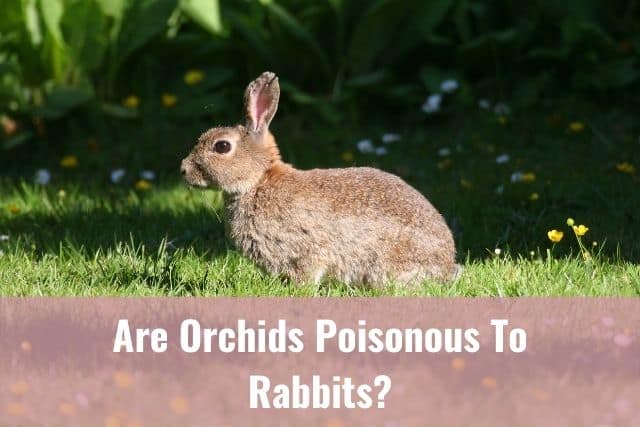
While orchids are safe to have around your pet rabbit, many other houseplants are not. I’ll go over which plants are toxic to rabbits and which aren’t, how to spot signs of poison or toxicity in your rabbit, and what to do.
I’ll also give you some ideas on how to keep your orchids safe from your rabbits. If your rabbit has eaten some of your orchid, there are certain steps you’ll need to take in order to save your orchid. Keep reading to learn more.
Please note that these links are affiliate links and as an Amazon Associate, I earn from qualifying purchases. Purchases made through affiliate links in this post may generate commissions at no additional cost to you. Use this link for a discounted Amazon Prime trial. Thank you for your support!
Table of Contents
Are Orchids Poisonous To Bunnies?
The good news is, Phalaenopsis orchids are not poisonous or toxic to rabbits. These orchids are one of the most popular and most commonly sold orchids worldwide. Fortunately, these orchids are also safe to have in your home and around your rabbit.
Many other orchid varieties are also fine to have around your rabbits. However, remember that there are tens of thousands of orchid species out there. Many of these species have not yet been studied for their effects on animals, so keep that in mind.
If you have a rare orchid or a rabbit that loves to munch on everything and anything, I would recommend that you keep your rabbit separate from your plants. Just because some orchids are safe for rabbits doesn’t mean that all orchid varieties are safe.
What Should I Do If My Rabbit Has Eaten Part Of My Orchid?
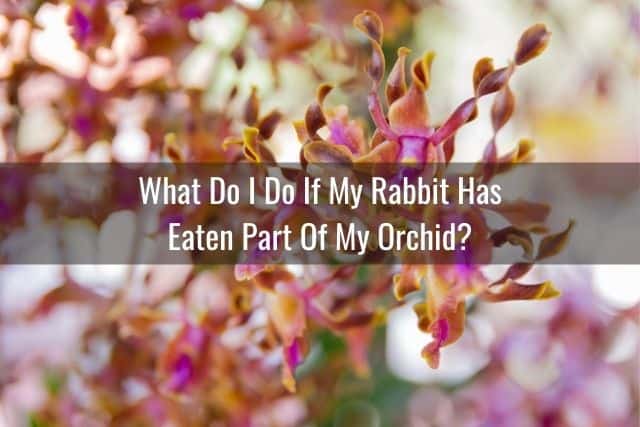
Even if your orchid is not toxic for your rabbit, what should you do if your rabbit bites off part of your orchid? I’ll go over some scenarios below and what to do.
Rabbit Ate Part Of The Orchid Leaf
If your rabbit has eaten some or part of your orchid’s leaf, don’t worry. As long as there isn’t too much damage, the orchid will, in time and with the right care, grow new leaves. Give your orchid a lot of TLC, or tender loving care, as it recovers. It is likely stressed from the trauma.
However, the leaf that has been chewed or gnawed on will not grow back. I would recommend pruning off the gnawed edges of the leaf using sterilized scissors. You don’t have to cut off the whole leaf if just the outer edges were chewed. Just trim off the chewed areas.
Dust the cut ends of the leaf with cinnamon powder. Ground cinnamon will help prevent infection to your orchid.
If your rabbit has chewed off all your orchid leaves, don’t stress. There is still hope for your orchid. Don’t throw it away!
As long as you still have viable roots on your orchid, you can save an orchid that has lost all of its leaves. Check out this step-by-step guide on how to save an orchid without leaves for more information.
Rabbit Ate The Orchid Flowers Or Flower Spike
If your rabbit has chewed off your orchid’s flowers or part of the flower spike, those will not grow back. Your best course of action would be to prune the orchid’s flower spike so that you remove the gnawed edges. A rabbit’s mouth is not clean and may have some bacteria that could infect the orchid.
Use sharp, sterilized scissors to remove the gnawed end. Similar to how you would treat a chewed leaf, dust the cut end of the flower spike with ground cinnamon powder to prevent infection. Depending on where you made the cut, you may be able to rebloom your orchid from a lower node on the flower spike.
Orchid Roots Were Broken By The Rabbit
In some cases, your rabbit may have tried to dig in your orchid’s pot, accidentally destroying some of the orchid roots. If that is the case, you will need to remove the orchid from the pot and trim off the ends of any damaged roots.
Use sterilized gardening shears to make a clean cut. Repot your orchid into fresh potting media, and this time, put your orchid where your rabbit can’t reach it.
Why Is It So Concerning If Your Rabbit Eats A Poisonous Plant?
While orchids are safe to have around rabbits, many other houseplants are not. If your pet rabbit ingests a poisonous plant or object, this is a major concern for you, as the pet owner. Unlike dogs and cats, rabbits are not able to vomit.
This means, rabbits cannot vomit the poisonous plant back up and get rid of the toxins they have ingested. If your rabbit accidentally eats something toxic or poisonous, he or she could become very ill or even die. As a result, you want to be very mindful of what kind of plants you have in your home, especially if you allow your pet rabbit to roam freely in the home.
Keep in mind that even if your rabbit eats a plant that turns out to be poisonous, they would need to have eaten it in large quantities in order for the poison to affect them. This gives you enough time to get your rabbit to the nearest vet.
If your vet’s office is closed and you live in the United States, you can also call the ASPCA hotline at (888) 426-4435 (this is the phone number at the time of writing). This hotline is staffed 24/7, 365 days a year, so if you are concerned that your pet may have ingested a poisonous substance, give the ASPCA Poison Control hotline a call.
What Are Some Common Houseplants That Are Poisonous To Rabbits?
A rabbit’s teeth are constantly growing, hence their need to constantly chew and gnaw on things. Plus, it’s in a rabbit’s nature to nibble and graze on vegetation. A bunny that lives inside a house will gnaw on shoes, furniture, and you guessed it, houseplants.
With that in mind, you want to be careful with the type of plants you keep in your home. Some popular houseplants that are poisonous to rabbits include:
- Monstera AKA The Swiss Cheese Plant
- Ivy (any kind of ivy)
- Golden Pothos
- Asparagus Fern
- Aloe Vera
- Chrysanthemum
- Peace Lily
You can find a more exhaustive list of toxic plants at the ASPCA website. These plants are toxic for animals, including dogs and cats, and not just rabbits. If you have pets in your home, I would recommend that you keep these plants in a separate room away from your pets, or out of the house altogether.
What Are Some Houseplants That Are Safe To Have Around Rabbits?
Say your rabbit has free reign in your home, or is a rather curious animal, and you can’t watch it every minute of the day. Rather than worry what might happen if your rabbit accidentally eats part of your plant, a better solution would be to just keep safe, non-toxic rabbit-friendly plants in your home.
Here are some examples of non-toxic plants that are safe for rabbits.
- Orchids including Phalaenopsis orchids, Jewel orchids, Bulbophyllum orchids, and Miltoniopsis orchids
- Herbs such as basil, mint, and chamomile
- Catnip
- Pansies
- Spider plant
- Dracaena indivisa
- Jade plant
- Parlor palm
- Lipstick plant
- Boston fern
For more ideas of non-toxic plants that are safe to be around your pets, check out the ASPCA’s list of non-toxic houseplants.
Can Rabbits Eat Orchid Flowers?
Yes, rabbits can eat orchid flowers. You might find that rabbits are attracted to the bright, colorful blooms and will start nibbling on them. Eating the blooms won’t harm your rabbit, but it can be very disappointing to lose those beautiful orchid flowers.
To prevent the rabbit from eating your orchid flowers, move your blooming orchid to an elevated location. This way, the bunny will not be able to jump to or reach the flowers. Also, keep the cascading flower spikes out of reach.
What To Do If Your Rabbit Eats Your Orchid Flower, Root Or Stem?
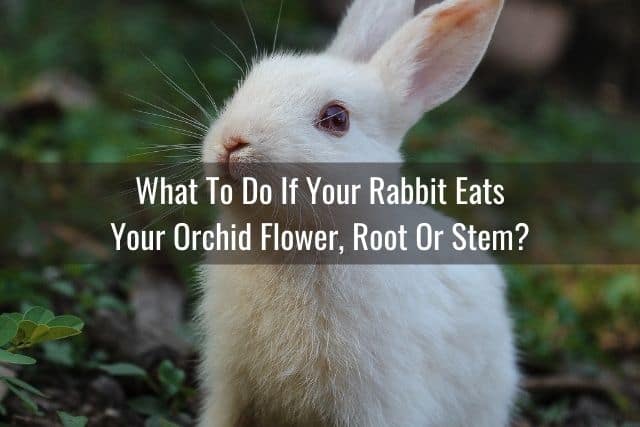
If you catch your rabbit eating your orchid, the first thing you should do is move the orchid away from the rabbit. Put the orchid somewhere out of the rabbit’s reach so that it won’t be able to munch on the leaves or flowers anymore.
If your rabbit was eating your Phalaenopsis orchid, chances are, it will be fine. However, if your rabbit was chewing on a unique or rare orchid variety, it won’t hurt to give your veterinarian a call and get their advice. Depending on how much of your orchid the rabbit has eaten, and what type of orchid it is, you may be able to just monitor the situation from home.
For example, if your rabbit has just nibbled off the flower or part of the orchid leaf, the vet may advise you to just monitor your rabbit for the next few hours or the rest of the day.
You will need to look out for lethargy, decreased responses to stimuli, decreased appetite, diarrhea, nasal discharge, or any other abnormal symptoms that would indicate your rabbit is sick. Seizures, bleeding, and changes in breathing patterns or difficulty breathing are other signs for concern.
Try to feed your rabbit a small treat every hour or so to check for appetite. Check if he or she is moving and hopping around as usual. Also, look to see if your rabbit is pooping as it normally would, in terms of frequency and consistency of the stool.
What If Your Rabbit Drinks From Your Orchid’s Humidity Tray?
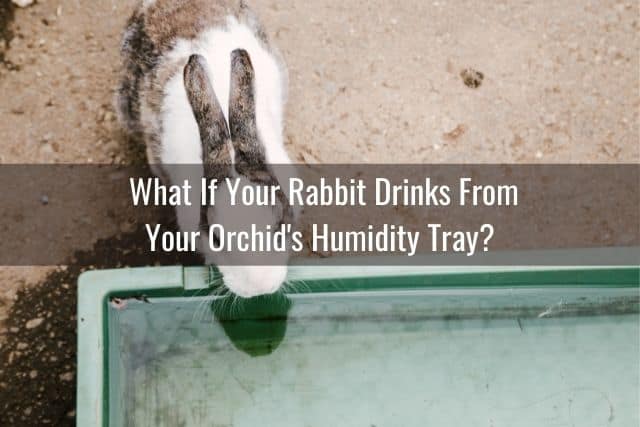
If your rabbit drinks from your orchid’s humidity tray, monitor for signs of poisoning, which I mentioned above. In this case, I would take the rabbit to the vet, or at the very least, give the vet a call.
The reason for this is that water in your humidity tray may contain fertilizer salts, residue or chemicals related to pesticide treatments.
For example, if you have a serious case of fungus gnats, you may have used mosquito dunk bits in the humidity tray water to deter fungus gnat growth. Or say you fertilized your orchid and allowed the residual water from the orchid pot to drain into the humidity tray. This water could contain trace amounts of orchid fertilizer.
While eating your orchid may not be harmful to the rabbit, drinking the water from the humidity tray can be. If you use a humidity tray under your orchids, make sure it is out of reach of your rabbits.
Do You Need To Take Your Rabbit To The Vet After It Eats An Orchid?
If your rabbit has eaten all of your orchid, plus some other houseplants, your vet may ask you to bring your rabbit in to the clinic for an examination. While most orchids are non-toxic, the same cannot be said for many houseplants.
Many popular houseplants have some level of toxicity in them. If you paired your orchids with these particular houseplants, and all your plants are in the same vicinity, well, your rabbit might have sampled all of them, not just your orchid.
Always give your vet a call if you aren’t sure about what to do. Take your rabbit in to see the doctor if you are even a little bit concerned. As I mentioned, rabbits aren’t able to regurgitate what they’ve eaten. Depending on what they ate and how much, your rabbit may need to be checked out by a professional.
How To Protect Your Orchids And Other Plants From Rabbits
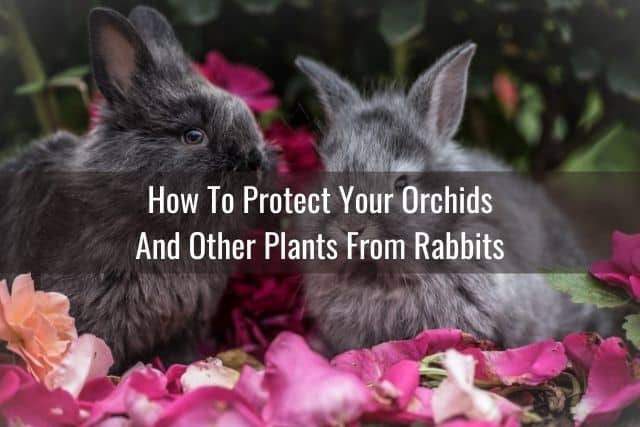
While orchids may not be poisonous or toxic to rabbits, you still want to do what you can to protect your orchids from your rabbit. Rabbits are pretty determined creatures. Once they set their sights on something, whether it be one of your houseplants, or one of your precious orchids, they will jump and hop and try all they can to get to and eat your plant.
There are a few things you can do to protect your orchids and keep them from being eaten by your rabbit.
Elevate Your Plants
Keep your orchids and other houseplants up high and out of reach. This may mean putting it on a high shelf or in the middle of a table.
Obviously, rabbits can hop and jump, so when you are putting your plants in a room, be very mindful of the placement of the plant. Can your rabbit hop onto a chair, then to a nightstand, then to a shelf to reach your orchid? If possible, place the orchid high enough that the rabbit will not be able to jump to the plant or reach it by other means.
Block Off Your Plants
You can keep your orchids in the same room as your rabbits as long as the rabbit cannot access the orchids. To achieve this, use a pet gate or a baby play space to block off a section of the room where you keep your plants. Make sure it’s high enough that the rabbit cannot jump over it. It also needs to be sturdy enough that the rabbit cannot knock it down or shimmy through a gap.
Keep The Plants In A Separate Room
Another thing you can do is to only give your rabbit access to certain rooms of your house. For example, maybe your rabbit has free rein of your bedroom and bathroom, but not the living room, kitchen or office area.
Keep your orchids in the rooms where it is not allowed to go in. Make sure the doors to these rooms stay closed when you are not in them.
Ways To Keep Your Rabbit Safe
While those suggestions above are specific ways you can keep your orchids safe from your rabbits, there are also some steps you can take to keep your rabbits safe from your plants. Orchids are safe and non-toxic, but other houseplants might not be so rabbit-friendly.
Make sure you prune your plants regularly. Snip off any yellowing or dying leaves or flowers before they fall to the ground. Vegetation on the ground, even if it is wilted or dying, may still be tempting to your rabbit.
Additionally, provide chewing alternatives to your pet rabbit to keep him or her occupied. You can purchase wicker balls, hay sticks, or other chew toys for your rabbit. This will help distract them from your plants and is a much better, safer alternative.
Final Thoughts
Rabbits are fun pets to have, but can definitely be a lot of work! Orchids are safe to have around these adorable pets, and you don’t have to worry if your rabbit accidentally eats part of your orchid. As long as you have one of the more popular orchid varieties, such as the Phalaenopsis orchid, you can relax. This orchid variety has been tested and found to be non-toxic and non-poisonous.
All the same, for the sake of your orchids, I would encourage you to do all you can to keep your orchids away from your rabbits. Rabbits are known for grazing and nibbling on plants. While your rabbit may survive after eating your orchid, the same may not be said for your orchid.
If you enjoyed this article, please pin it and share!
